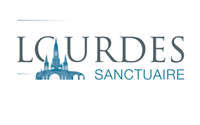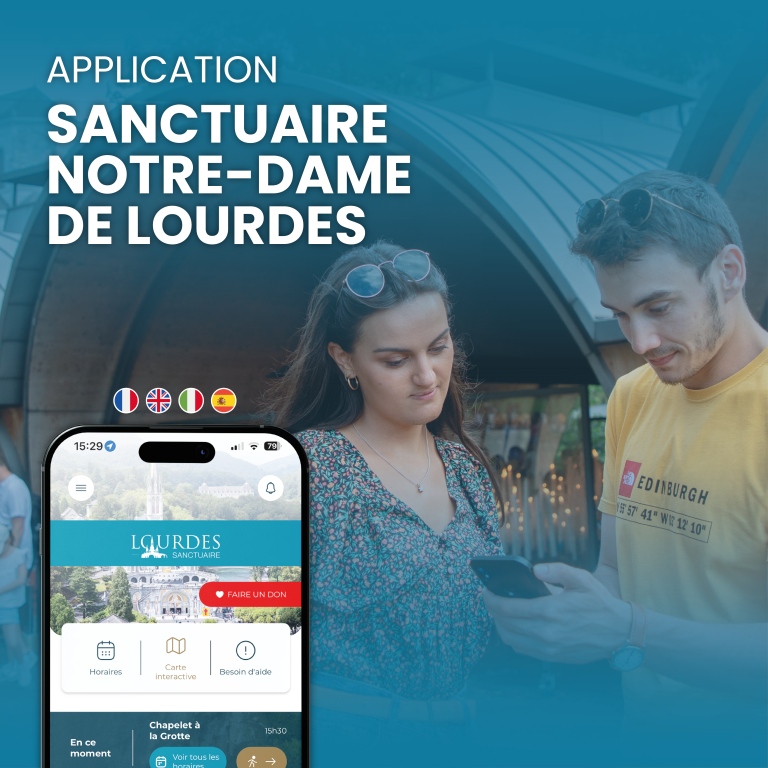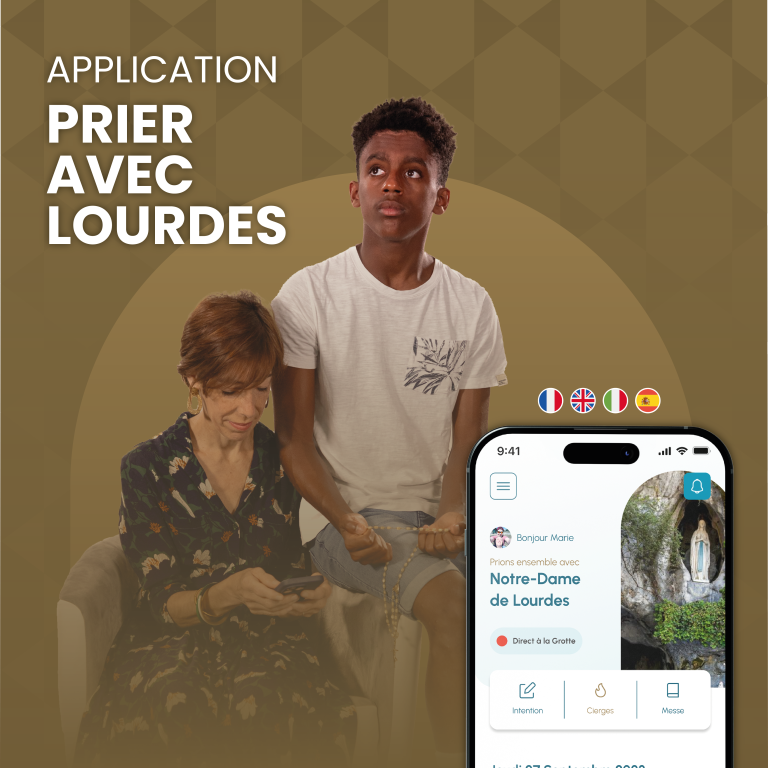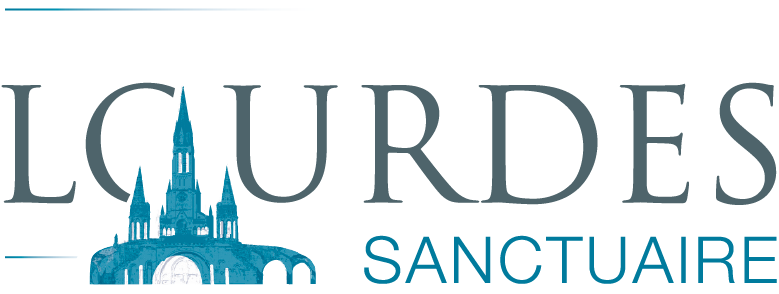R/ At your side, Bernadette, we travel on toward heaven’s holy light.
C.2- Lead our steps onward, toward the Lady
dressed in white,
whose smile is welcoming to sinners
in their plight! R/
C.5- Lead our steps onward, toward our neighbor
in distress,
may we be merciful to all who are oppressed! R/
(Recalling the first apparition.)
On 11th February 1858, though she does not know it, someone is waiting for Bernadette, a poor child. As she
arrives in front of the dark crevice of the rock, forced to stop because she knows she mustn’t put her feet
into the icy water of the stream, she hears “a noise like a gust of wind”, then she sees a light, taking shape:
the shape of a young lady, “as young and as small as me,” she said.
This is the beginning of a series of encounters, focused on the sign of the cross, a beautiful sign of the cross
that the Lady made, “in the name of the Father, and of the Son and of the Holy Spirit”: the mystery of God
full of love which is revealed by His death on the Cross, the mystery of a love that triumphs over death.
God opens His heart and, through Mary, invites us here to experience anew this river of love and life, flowing
from the pierced side of Jesus crucified.
In the name of the Father, and of the Son and of the Holy Spirit. AMEN.
(Step 1. The joy of the encounter.)
We are the family of God and He wants to make those of us who have been scattered by sin into a family
reunited by love. We do not know each other, we are not the same age, the same race, the same class, …
Our differences become our shared wealth.
“Will you do me the honour of coming here for a fortnight?” She was the first person to ever call me ‘vous’,
the first one who had ever asked me to do something for them (Bernadette always had to ask for everything,
now she is able to give.) “She looked at me as one person speaking to another person.” It’s so simple, and it’s so important!
Bernadette promises to come back. And the young lady makes a promise in her turn, “I do not promise to
make you happy in this world but in the other.” Bernadette will discover the world of love, where even
suffering does not preclude happiness. A difficult life, a wounded body, spirit or heart, and even sin itself,
can all lead us to be one with the Heart of Jesus wounded by love.
We are invited to share a friendly gesture of greeting, in the grace of Mary’s encounter with Bernadette:
“She looked at me as one person speaking to another person. “
Hymn theme 2019
1-How happy are you, the poor,
whose hearts are ever open to Love;
for God, himself now becomes one with you,
to fulfill your desires.
R/ Deep within your hearts rejoice and praise the Lord,
for He prepares a great reward for you in heaven!
Deep within your hearts, rejoice and praise the Lord
rejoice and praise
God prepares a great reward for you in heaven!
2- How happy are you,
the poor, who hunger for justice and right:
come guests, whom the Lord invites
to his table, abundant and lavish.
(Step 2. Operation Truth.)
Love cannot look inwards. Bernadette is invited to drink at the spring and wash herself there. To do this, she
has to dig in the mud that has accumulated at the base of the grotto, until she finds a puddle of dirty water,
which she is barely able bring to her mouth, and with which she smears her face. She kisses the earth and
eats a few tufts of wild herbs. Everyone thinks she’s gone crazy!
But she explained her actions. The lady was so sad! It seemed as if she was carrying all the misery of the
world on her shoulders. She said to me, “Penance! Penance! Penance! … for sinners! “ Sinners! These people who have severed the bond that sustained them, and who crawl on all fours like beasts, who eat grass and roll around in the mud!
In our own lives, in the lives of our loved ones, in the life of the Church and of the world, we experience so
much suffering! The worst of all is the desperation that stifles our hearts and renders them incapable of
loving: it is the desperation of sin, the desperation that God comes to heal by offering us Mary’s tenderness.
We are no longer afraid of the mud because, in the depths of the mud, there is not mud but the spring. In
the depths of sin, there is not sin, but mercy, and forgiveness. The God of Love has not forgotten what he
told us: I baptise you. He comes to tell us again: I forgive you. In the grace of our pilgrimage, the Lord wants
to open our hearts and, through us poor pardoned sinners, he wants to give birth to a family reconciled in
love.
So, we are invited to make a special gesture: the one which Mary asked of Bernadette, and which
scandalised the first people who saw it: to put our hands into the mud, possibly even to smear our
faces, to drink …
Then we will let ourselves be washed by one of our brothers or sisters. It is through one another
that we are purified, healed. It is through the heart of another that the Heart of God reaches us. And
it is through loving abandonment to the Heart of the Lord that we will reach out to the hearts of
our brothers.
Bernadette’s gestures are not particularly new: The Gospel of Jesus paves the way along the path of
conversion, so that we may overcome the misery of sin and come to a life reconciled in the richness
of His love.
Celtic Alleluia
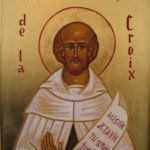
As he passed by he saw a man blind from birth. His disciples asked him, “Rabbi, who sinned, this man or his
parents, that he was born blind?” Jesus answered, “Neither he nor his parents sinned; it is so that the works of God might be made visible through him.”
When he had said this, he spat on the ground and made clay with the saliva, and smeared the clay on his
eyes,and said to him, “Go wash * in the Pool of Siloam” (which means Sent). So he went and washed, and came back able to see.
His neighbors and those who had seen him earlier as a beggar said, “Isn’t this the one who used to sit and beg?” Some said, “It is,” but others said, “No, he just looks like him.” He said, “I am.” They brought the one who was once blind to the Pharisees. Now Jesus had made clay and opened his eyes on a sabbath. So then the Pharisees also asked him how he was able to see. He said to them, “He put clay on my eyes, and I washed, and now I can see.” So some of the Pharisees said, “This man is not from God, because he does not keep the sabbath.” But others said, “How can a sinful man do such signs?” And there was a division among them. So they said to the blind man again, “What do you have to say about him, since he opened your eyes?” He said, “He is a prophet.” They answered and said to him, “You were born totally in sin, and are you trying to teach us?” Then they threw him out.
When Jesus heard that they had thrown him out, he found him and said, “Do you believe in the Son of Man?” He answered and said, “Who is he, sir, that I may believe in him?” Jesus said to him, “You have seen him and the one speaking with you is he.”He said, “I do believe, Lord,” and he worshipped him.
This is the gospel of the Lord
Bernadette was not afraid of mud. Bernadette never forgot her poverty, her misery. Her final words were,
“Pray for me, poor sinner …”.
But neither would Bernadette ever forget Mary’s gaze: she knew that there was an immaculate, unstained
part of her that could not be destroyed by sin or death. When we recognise that we are sinners, God’s
mercy, God’s forgiveness reaches us and brings us to rebirth.
It is the grace of trust that allows us to approach the Sacrament of Reconciliation. In solidarity with the world in all its misery and sin, we express the joy of discovering the spring of living water that is freely given to us.
We can go together to the Grotto to wash, but we can also extend our devotions by lighting a
candle in the chapel of light. In this way we are bringing together these two signs of new life: water
and light, which remind us of our baptism.
« Ô Pauvreté, source de richesse… Jésus, donne-nous un cœur de pauvre ! »
“O Poverty, source of richness … Jesus, give us a poor heart! (Taizé Chant)
If we stay where we are after putting our hands in the mud, it is a wonderful experience to be able
to wash with water received from a brother or sister, as this gesture allows us to enter into the
grace of healing through the support of the community we have built.
Music or meditative hymn, [e.g. Oh let all who thirst] during the water gesture.
We can also use the words of Bernadette that are suggested after the third step.
C.2- I saw the stream become a river
Alleluia! Alleluia!
The sons of God all assembled sang their thanks for being saved:
Alleluia! Alleluia! Alleluia
C.3- I saw the Temple gates thrown open wide to all,
Alleluia! Alleluia!
The Victor, Christ, bearing still his wounded side,
comes once again,
Alleluia! Alleluia! Alleluia .Alleluia
C.4- I saw the Word extend to us God’s heavenly peace,
Alleluia Alleluia!
All who believe in his name
will thus be saved and they will sing,
Alleluia! Alleluia! Alleluia
(Step 3. Build the chapel, come in procession.)
Bernadette receives a commission for the priests: that a chapel should be built, and that people should come in procession. When we receive the Good News, we are also called to be messengers of the love which saves and delivers us.
We are invited to challenge our priests, to awaken the Church, so that it may bring into being small chapels,
small Church houses or domestic churches, small missionary communities in which we can share the joys of the Spirit at work in our world, and where we can also find the strength to prepare for and follow the work
of the Spirit wherever we live.
In Lourdes, we discover the joy of the Church as a family, of which Mary is the mother and our model. Here,
Mary gave her name as, “the Immaculate Conception”, the perfect transmission of a Life, of a Love that takes flesh in her and that she brings to the world. Mary pronounced her name on 25th March, the day on which Jesus began His existence in her womb. What is born is tiny, what is born is entrusted to us like a little child.
Bernadette remembered, and wrote in a letter of 22nd August 1864, “She had blue eyes,” the same colour as
the eyes of a new-born.
When we get home, we are encouraged to come together in small communities, which will help us to discover the presence of God in our lives and to share our witness: for example, in Gospel sharing teams, prayer groups, missionary communities, … Let’s look at what exists already and let’s ask for the grace of the Spirit which will help us to create what does not yet exist.
With Bernadette, we ask for the grace to live every day like a new-born, reborn into the life of baptism, into the life of the children of God: the two-fold grace of humility and trust.
(These words of Bernadette can be used during this third stage, and also during the water
gesture.)
In May 1866, before leaving Lourdes for Nevers, Bernadette wrote a prayer that she repeated every day of
her life to ask for humility, the “prayer to the Queen of Heaven”:
How joyful was my soul, O good Mother when I had the happiness of seeing you!
How I like to remember those sweet moments under your gaze, your eyes full of goodness and
mercy for us. Yes, dear Mother, you lowered yourself to the earth to appear to a weak child and
communicate certain things, despite her great unworthiness. How she lacks humility!
You, the Queen of Heaven and Earth, have wanted to use that which is weakest according to the
world.
O Mary, give to the one who dares to call herself your child, this precious virtue of humility. O loving
Mother, make your child imitate you in all for all. In a word, may I be a child according to your heart
and that of your dear Son.
To relate to Bernadette’s prayer, to be welcomed into the family of Mary, to become a child of God and
brother of Jesus, we should let ourselves be led on the path of a simple faith, the path of the hidden daily life
of St.Gildard’s convent in Nevers. The following words are from the very first lines of Bernadette’s Notebook:
My own concerns no longer concern me: from now on I must belong entirely to God, and God alone. Never
to myself.
I shall not live a single moment without loving. He who loves, does all things easily, or, if he suffers, he loves
that suffering.
O Mary, my dear Mother, here is your poor child, unable to carry on any longer; you know my needs and
above all my spiritual distress; have pity on me. Grant that one day I may be with you in heaven.
I was nothing, but from this nothingness Jesus made something great. Yes, as I am, in some sort, in God by
holy communion; Jesus gives me his heart, I am therefore heart to heart with Jesus, spouse of Jesus, friend
of Jesus, that is to say, another Jesus. Therefor I must live in Jesus, my aim must be that of Jesus himself.
How sublime is our end!
Then I raised my eyes and saw nothing else but Jesus alone!
Jesus alone for my goal,
Jesus alone for Master,
Jesus alone for Model,
Jesus alone for Guide,
Jesus alone for Joy,
Jesus alone for Riches,
Jesus alone for my Friend!
We come back to the Cross which opened the path for us, but always in the presence of Jesus. An
instrument of torture can become the medium of an ever-stronger love.
(To finish)
The angel did not stay with Mary in Nazareth, the Apparitions did not last forever for Bernadette: she left
Lourdes for the daily routine of ordinary life in Nevers; Mary set off to visit her cousin Elisabeth. We, too,
leave, nourished by the Gospel entrusted to us, carrying the life of Jesus to the world.
We sing Mary’s song of thanksgiving, the Magnificat of hope.
R/ Magnificat, magnificat anima mea Dominum.
C.1- My soul glorifies the Lord,
my spirit rejoices in God, my Saviour. R/
C.2- He looks on his servant in her lowliness;
henceforth all ages will call me blessed. R/

